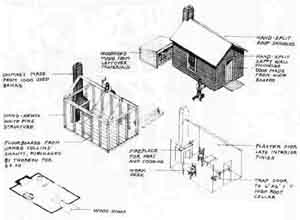Return to North Glen
or Reading List
or Credo
|

|
Henry
David Thoreau (1817-62), American writer, philosopher, and
naturalist,
whose work demonstrates how the abstract ideals of libertarianism
and individualism can be effectively instilled in a person's life.
Of the numerous volumes that make up the collected works of
Thoreau, only two were published during his lifetime: A Week on the Concord and Merrimack Rivers (1849) and
|
|
Walden;
or, Life in the Woods (1854), the account of two years' living in
a self-built cabin
(illustrated right).
The material for the other
volumes was edited posthumously by the author's friends from his
journals, manuscripts, and letters.
|

|
Thoreau chose going to jail
rather than supporting the Mexican War by paying his poll tax. He
clarified his position in perhaps his most famous essay, “Civil
Disobedience” (1849). In this essay he discussed passive
resistance, a method of protest that later was adopted by the Indian
leader Mohandas Gandhi as a tactic against the British, and by civil
rights activists fighting racial segregation in the U.S.
Walden,
Thoreau's most popular work, gives a plain and straightforward
statement of the author's reasons
for adopting the contemplative life and a graphic
account of the principal details
of that life. His journal entries and essays have great literary
value and reflect Thoreau's pronounced gift for a careful, but
refreshing
writing style.
During his sojourn at Walden
Pond and elsewhere in Concord, Thoreau supported himself by doing
odd jobs, such as gardening,
carpentry, and land
surveying. The major portion of his time
was devoted to the study
of nature, to meditating
on philosophical
problems, to reading
Greek, Latin, French, and English literature, and to long
conversations with his neighbors.
A Week on the Concord
and Merrimack Rivers is the narrative of a boating trip taken in
August 1839; it is a combination of nature study and metaphysical
speculation and bears the distinctive impress of the author's
engaging personality.
Thoreau was born on July 12, 1817, in
Concord, Massachusetts, the son of a businessman, and educated at
Harvard University. For some years he taught school and tutored in
Concord, and on Staten Island, New York. From 1841 to 1843 he lived
in the home of the American
essayist and transcendental philosopher
Ralph Waldo
Emerson, where he met other American transcendentalists, such as
the educator and philosopher Amos Bronson Alcott and Margaret Fuller
and George Ripley, both social reformers and literary critics. Two
years later he moved to a crude
hut on the shores of Walden Pond, a small body of water on the
outskirts of Concord. He lived there until 1847, resided again with
Emerson during 1847-48, and spent the years from 1849 with his
parents and sister in Concord. Thoreau died on May 6, 1862.
Return to North Glen
or Reading List
or Credo




